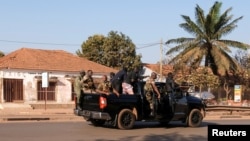Guinea-Bissau is the latest West African country to be swept up in a coup contagion that has already hit Guinea, Mali, and Burkina Faso. Though Tuesday's coup attempt in Guinea-Bissau was unsuccessful, the country continues to reel from political instability, corruption and drug trafficking.
It started as they so often do: with a spatter of gunshots outside a government building. Inside, Guinea Bissau’s President Umaro Sissoco Embalo was holding a cabinet meeting.
Though Embalo survived the attempted coup – both physically and politically -- several security personnel died protecting him and his ministers.
There have been four successful coups in Guinea Bissau since the country gained independence from Portugal in 1974, and many more attempts. The impoverished country of two million is a transit hub for cocaine trafficked from South America to Europe.
Western governments believe members of the country’s military are complicit in the trade.
Though this coup could be tied to drug trafficking, other recent coups in the region have been fueled by anger over a surge in jihadist activity.
But the common thread is poor governance, says Barka Ba, a Senegalese political science researcher.
The solution, Ba says, is for regulatory bodies like ECOWAS – the 15-member Economic Community of West African States – to get involved before a crisis implodes instead of implementing sanctions after the fact.
For the moment, he says, it makes them seem incapable and powerless to handle this phenomenon. So it’s an opportunity for ECOWAS to restore its image and readapt so it can gain much more credibility and influence on the events taking place.
ECOWAS most recently implemented sanctions on Mali and Guinea after successive coups last year.
The bloc is currently holding an emergency summit to decide whether to impose sanctions on Burkina Faso, where the military overthrew President Roch Marc Christian Kabore on January 23.
John Mukum Mbaku is a Cameroonian native and a senior fellow with the Brookings Africa Growth Initiative.
He urged West African nations to give democracy a chance.
“Democracy is a work in progress," said Mbaku. "You have to work at it. Getting soldiers to overthrow the government, it will only exacerbate problems. Being able to use the constitution and the law to discipline individuals who are not performing well is the only way African countries can move ahead and develop democratic systems.”
Instead of coups, Mbaku said citizens can hold their governments to account by protesting, voicing their concerns on social media and seeking out help from human rights organizations.




